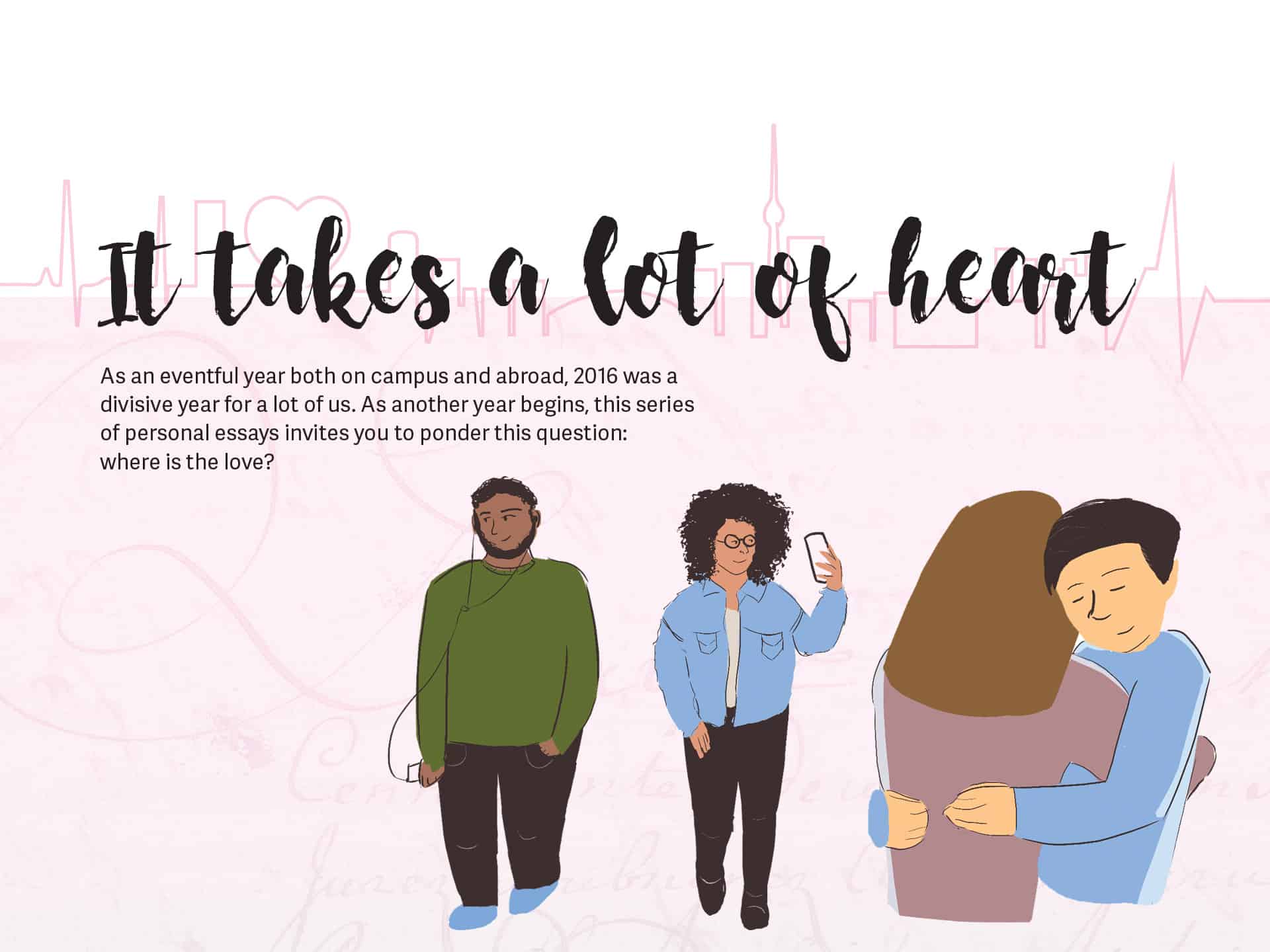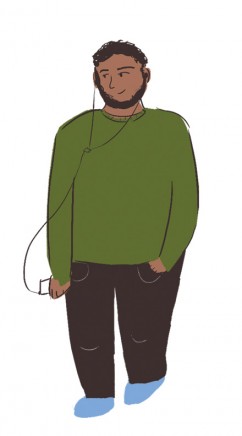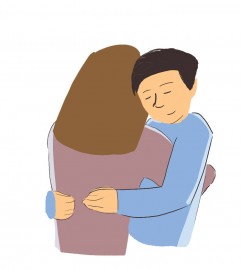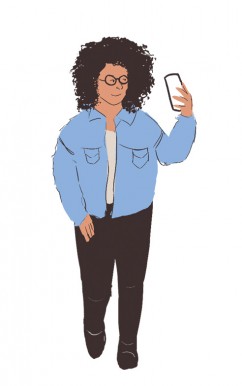That zsa zsa zsu
Following a mediocre first date, a second-year falls in love
with the city instead
By Avneet Sharma
Standing in the middle of aisle five and debating between the regular and “Heal-Fast” ointments at the Shoppers across from Mod Club, I realized that I had finally found love.
It started with a first date — the first date I’d ever had. I donned a pair of navy blue Steve Maddens for the special occasion, feeling stylish as I paired it with my green cable knit sweater that made me feel like Lola Kirke in Mistress America. Needless to say, it didn’t turn out too well.
Staring into my grande chai tea latte, now half-empty and looking frothy and unappetizing, I didn’t know how I could get through more awkward silences, tense laughter, and overall anxiety.
I didn’t expect to find love on my first date, but I was hoping there would have at least been a spark, or as Carrie Bradshaw would say, that zsa zsa zsu which would at least indicate the possibility of love.
It can be difficult to find that zsa zsa zsu, especially in a city like Toronto where the options are so limitless that we feel constrained. I wanted to connect with a person who gave me butterflies. In a period of my life where I felt increasingly apathetic and lonely, I was looking for someone who I would want to be with all the time. If he was cute, that would be a bonus.
Instead, I ended up walking down Queen Street, going to the Eaton Centre alone after the date. He had just told me that he didn’t want to lead me on, and that he just wanted to be friends. I didn’t want to admit it, but I felt the same way. I didn’t find love in Toronto that night.
Later, hanging out at a friend’s place, I pulled out my phone and noticed that a stranger had texted me, offering to sell me their ticket to see Tokyo Police Club at the Mod Club. A few weeks before, I had posted on the Facebook event page looking for a ticket. I resolved to not being able to go when no one responded.
Now it was 9:30 pm. Their set was starting in half an hour, and I had the opportunity to see them. A meticulous planner, I don’t consider myself impulsive. Any other night, it would have been ridiculous to go to a concert when I didn’t plan to. It was even more ridiculous to trust a complete stranger and send them an e-transfer.
But that night, I felt spontaneous. Five minutes later, I found myself in an Uber to the Mod Club, arriving just in time to purchase a drink and secure myself a spot on the balcony. As the band walked on stage and played the first chords of “Not My Girl,” I felt that zsa zsa zsu. I didn’t need to find love in Toronto – I needed to fall in love with Toronto.
Depression and generalized anxiety prevented me from falling in love with Toronto sooner in the one and a half years I’ve lived here. The transition to university, one that I romanticized in my high school years, had been marred by loneliness and, most of all, disappointment. I thought my narrative as a gay teenager unable to fit in at the suburbs would be rectified while living in the city.
Instead, like many students, I found the transition to university difficult. In the midst of essays, tests, and assignments, I never felt like I was truly part of the city.
Living in Toronto gave me the opportunity to be spontaneous. Best of all, it gave me the opportunity to turn a weird day into a wonderful evening alone. The biggest mistake I’ve made is staying in the mindset that being alone is inherently a bad thing.
It’s fun not always having to worry about someone else. It’s nice not having to deal with awkward silences, tense laughter, and overall anxiety. Instead, I could spend a Friday night sipping on a rum-and-coke and belt out the lyrics to “Favourite Colour” with a group of strangers who loved Tokyo Police Club as much as I did.
Shout it to the rooftops
A clueless fourth-year finally feels love by showing it
By Vivian Xie
I recently learned that I’ve been pronouncing love in Chinese incorrectly my entire life. The “ai” sound is like “I”. My second generation tongue has been saying it like the e in “egg.” What I thought had been the authentic pronunciation turned out to be a bastardized form of the true word, a fitting metaphor for my relationship to the feeling itself.
Growing up in a Chinese household taught me to save my emotions for when I was by myself, away from the judging gaze of others. This pertained to all emotions: approval, disapproval, pleasure, sorrow. Crying was a sign of weakness, rage a sign of no control. Happiness was reserved for the best of occasions.
The expression of love was no different. My family defies the idea that Asian families are foreign to the concept of love. We say “I love you” regularly, hug, exchange good-night kisses. But outside, under public scrutiny, there is no handholding, no hugging, no indication that we are a tight-knit family.
As a result, I only knew love to be something that should be hidden, reserved for private, and it manifested in multiple facets of my life. My friendships were all tentative and short-lived. Once the school year ended, and we ascended the educational ladder, we moved onto the next friend as though our schoolyard games of four-square and basketball never happened. More telling was the fact that my relationships, romantic or otherwise, were all based on the unstated mutual agreement that there would be no exhibition of love or support.
I recall one friendship I had in middle school with two girls, both Chinese. We hung out at recess, stuck together for group projects, and were never seen without at least one other. Yet, we never did anything to let the each other know how much we loved them.
Perhaps we thought it was too corny. Perhaps we operated under the idea that true friends expressed love through mild insults and teasing. Or perhaps we were all unable to reconcile the idea that love in a relationship could be expressed without being fake. If anything, our form of love was more inauthentic. Without expressing love outright, jealousy and envy weaseled their way between us when anyone achieved anything. The love that I had for them never felt real. It always felt like something I had to act out, a daily performance of false compliments and forced smiles.
University challenged my perspective of love and its expression. In first-year, I saw but three people on a semi-regular basis. Our fear of showing each other care and affection is perhaps the biggest reason I have little contact with them now. A romantic relationship I allowed to fizzle out ended in part because he thought I was “distant,” something that confused me until recent reflection.
I loved them all, but they never knew it.
It wasn’t until third-year that I started to form long lasting friendships. The major difference I noticed was the open expression of positivity and support for one another (in between the roasting). After the first time we went to a bar together, my closest friend turned to ask before departing on the subway, “Do you like hugs?” I gave her a startled nod before thinking it through and was suddenly encased in her arms. It was then that I realized I enjoyed this concept of love, one that was unhindered, unequivocal, and unafraid to be known.
Allowing myself to show love, unrestricted from notions of shame or embarrassment, opened the path to feeling it without pretense. And this isn’t limited to feeling love. I cry more than ever now at heart-wrenching films, I shout with joy when my friend gets into graduate school. I will clap my hands in excitement when someone I meet shares the same geeky interests as I, and I let my dearest friends and family know how much I love them.
Why should we pretend we are all unfeeling automatons? We experience emotions, we feel joy and sadness and anger and love. Sometimes, it’s only after we show emotion that we realize what it is we’re feeling.
A study in radical self-love
One woman’s take on becoming as strong as people said she was
By Gabrielle Warren
I used to watch hours of Disney Channel and think of the day when I met my perfect boy who I’d walk on the beach with, hand in hand. That was fantasy. Real life wasn’t that way for me.
It seemed that as time went by, that special someone never appeared in my life. Instead, they seemed to come in the form of someone else’s boyfriend or a friend who would never see me as more than that — a friend.
Not all attention is good attention, but when you’re in high school and feeling as if you have warts on your face, any attention feels warranted. I had friends hit on by guys at parties. I had friends who had a string of relationships. That was never me. I felt invisible.
My role always seemed to fall as the best friend, mom, or pseudo sister — the person that was called on late at night, the shoulder to cry on. As the years went by, I asked myself, is there something wrong with me? “You’re the strong, independent girl,” they would tell me. “You don’t need anybody, but yourself,” they would say.
Women’s publications always tell women to love themselves unconditionally. However, little is said about finding the strength to love yourself. Regardless of how strong, independent, and amazing people told me I was, the pain of rejection and the desire for admiration still sat deep in my stomach. For a woman to look in the mirror and tell herself, “I am ok,” is a radical action that takes time and maturity.
During middle school, I fell in with the mean girl crowd, which swiftly ejected me after a couple of months. I felt lost. During that time, I buried myself in my schoolwork. It acted as my only constant. Regardless of how people treated me or the perceptions that people had of me — school would always be the same. If I put in hard work, I would get my due reward.
My dependence on schoolwork extended into my high school years. However, while school and work inhibited my insecurities and provided an output for my angst — suppression was not healing or dealing with those insecurities.
Suppression and denial landed me in a crooked pseudo relationship with a young man when I was seventeen. I never liked him in a Disney channel way, but over time, my desire for someone to see me in a more-than-friends type of way got the better of me. As I flirted and went on dates, I felt like my good sense was screaming for me to, “listen – GIRL, you’re making a terrible mistake.” Eventually, I realized that I was using this poor boy to massage my own ego. I knew that he was never who I needed, he was just a stop on the way.
On one hand, I felt selfish. School, work, and other commitments were integral to my future. There was nothing that could stop me. I felt confident in who I was and who I was becoming. On the other, I felt as if I wasn’t good enough. I felt that the markers of Disney best friends and boyfriends were absent in my life and therefore, part of me was absent.
The ending of that relationship marked the beginning of my university journey and I knew I had to choose. I was uncertain about many things, but one thing was clear — I required a paradigm shift. The insecurity I felt could not be cured by any person or multiple people.
Although my parents had programmed me to love myself at a young age, my independent realization of what that meant only began recently. It is a process where I had to look inside and see the strength that others had pointed out in me. I had to look at what I wanted and who I wanted to be.
I realized that I will be a lawyer, a disturber, and a writer. Regardless of who comes into my life, those pillars and goals will be constant. Instead of contorting myself to make others feel comfortable with who I am or be the person I think I’m supposed to be, I can be radically me.





